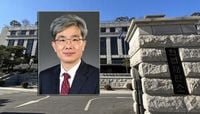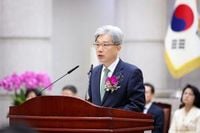On June 26, 2025, President Lee Jae-myung took a significant step toward restoring the Constitutional Court’s stability by nominating two distinguished legal figures to fill the vacant top positions. In a briefing held at the Yongsan Presidential Office, Presidential Chief of Staff Kang Hoon-sik announced that Kim Sang-hwan, a former Supreme Court Justice and current visiting professor at Jeju National University School of Law, was nominated as the candidate for Constitutional Court Chief Justice. Alongside him, Oh Young-jun, Chief Judge of the Seoul High Court, was named as a candidate for Constitutional Court Justice.
This pair is set to succeed former Chief Justice Moon Hyung-bae and former Justice Lee Mi-sun, who retired in April 2025, leaving two critical vacancies. Kang Hoon-sik emphasized the significance of these appointments as the "new government's first step" toward healing the Constitutional Court, which had recently faced turmoil that threatened its credibility and independence.
Kim Sang-hwan, 59, boasts a remarkable judicial career that spans decades. After graduating from Daejeon Bomun High School and Seoul National University’s Law Department, he passed the 30th Judicial Examination in 1988. His judicial journey began in 1994 at the Busan District Court and included key roles at the Uijeongbu Branch of the Seoul District Court, Seoul High Court, and the Supreme Court, where he served as a Judicial Research Officer. Notably, he also held the position of Chief Judge and Senior Chief Judge at Jeju District Court, forging a strong connection with Jeju Island.
His tenure as a Supreme Court Justice began in December 2018, followed by his role as Chief of Court Administration from May 2021 to January 2024. After retiring from the Supreme Court in December 2024, Kim transitioned to academia, becoming a visiting professor at Jeju National University’s Law School in March 2025. His contributions extend beyond the courtroom; in 2022, he played a pivotal role in revising regulations related to the "Special Act on the Investigation of the Jeju 4.3 Incident and Restoration of Honor for Victims," helping restore rights and dignity to victims and their families. For this, he received an honorary Jeju citizen certificate.
Presidential Chief of Staff Kang highlighted Kim’s reputation for deep expertise in constitutional and legal theory and his profound understanding of Korean society. "Kim Sang-hwan is highly regarded for his profound knowledge of constitutional and legal theory and is expected to add insight to constitutional interpretation based on his deep understanding of society," Kang said. This expertise, coupled with his judicial experience, positions Kim as an ideal candidate to guide the Constitutional Court through a period requiring renewed trust and independence.
Alongside Kim, Oh Young-jun was nominated as a candidate for Constitutional Court Justice. Oh, a 23rd Judicial Research and Training Institute graduate, currently serves as Chief Judge at the Seoul High Court. His judicial career includes roles as Supreme Court Judicial Research Officer, Chief Judicial Research Officer, Senior Judicial Research Officer, and Chief Judicial Research Officer. Kang praised Oh as an "excellent judge" within the judiciary, expected to enrich the Constitutional Court’s judgments with his exceptional legal acumen.
While Kim’s appointment as Chief Justice requires the National Assembly’s consent following a confirmation hearing, Oh’s nomination does not require legislative approval, though it does include a confirmation hearing. This procedural distinction underscores the importance of Kim’s role in steering the Constitutional Court’s future.
President Lee Jae-myung underscored the broader significance of these appointments, stating that the "great light revolution made by the citizens is based solely on the spirit of the Constitution," and that these nominations will play a "significant role in better constitutional interpretation." He expressed optimism that the citizens’ aspirations for change would enrich the Constitution and the nation’s legal framework.
In addition to these judicial appointments, President Lee also nominated Im Gwang-hyeon, a Democratic Party lawmaker and seasoned tax administration expert, as the candidate for National Tax Service Commissioner. Im, a graduate of Yonsei University’s Department of Economics and a successful administrative examination candidate, has held key positions including head of the Seoul Regional Tax Office and Deputy Commissioner of the National Tax Service. His experience extends to legislative work on the National Assembly’s Planning and Finance Committee, broadening his perspective on fair tax administration and taxpayer protection.
Kang noted that Im’s expertise would contribute significantly to advancing equitable tax policies and safeguarding taxpayers’ rights, aligning with the government’s commitment to fairness and transparency in fiscal matters.
The nominations come amid a broader push by President Lee’s administration to restore public confidence in key institutions and enhance governance. Kang described the judicial appointments as a decisive move to end the "dangerous level" of instability that had plagued the Constitutional Court, aiming to bolster the court’s independence and the public’s trust in constitutional adjudication.
Interestingly, the administration also addressed the candidacy of Lee Seung-yeop, a lawyer who was previously considered for a Constitutional Court position but declined the nomination. Lee’s involvement in trials related to President Lee’s own Public Official Election Act violation allegations had raised concerns about conflicts of interest, leading to his withdrawal from consideration.
On the same day as these announcements, President Lee delivered a government policy speech at the 426th National Assembly’s second plenary session, focusing on the 2025 second supplementary budget bill. This underscores the administration’s active engagement with legislative processes and its broader agenda for reform and stability.
These appointments mark a pivotal moment for South Korea’s judiciary and governance. With Kim Sang-hwan’s profound legal scholarship and judicial leadership, paired with Oh Young-jun’s respected judicial experience, the Constitutional Court is poised to regain its footing and reaffirm its role as a guardian of constitutional values. Meanwhile, Im Gwang-hyeon’s expertise promises to strengthen tax administration, reflecting the government’s dedication to fairness and efficiency.
As President Lee remarked, the citizens’ hopes for change and a richer constitutional future now rest in capable hands, signaling a new chapter in South Korea’s democratic journey.

![[속보] 李대통령, 헌법재판소장에 김상환 전 대법관 지명](https://thumbor.evrimagaci.org/Cz8ndeT-q8RHSQHIGjn6h7Q4L4o=/200x0/tpg%2Fsources%2Feab21ffd-3632-440f-82da-4847d9ae25ab.jpeg)




